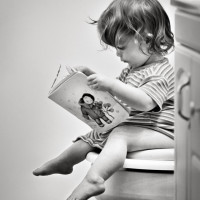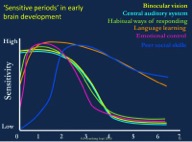Many of us look back at the early years of our own kids and wonder how we managed to ‘muddle through’. I, for one, wish I had known then what I know now! Parents go from a world of independence, adult company, and, for most of us we hope, a state of relative competence at what we do, to one of sleep deprivation, bodily mess, responsibility, and a new-found state of ignorance. In short, we find ourselves at the bottom of the steepest learning curve most of us will have faced.
But what is out there for parents? Lots of stuff about potty training and how to achieve it in a week (!!), but there is less accessible material about learning and how, as a parent, you might support it.
I had the pleasure of listening to two fascinating early years practitioners recently:
Helen Moylett shared with her audience a graph illustrating the sensitive periods in early brain development. Where the graph is highest, the brain is at its most receptive in terms of being ready to acquire the skills. No surprise in the first year that the brain is devoting energy to vision and auditory. Fascinating that peer social skills come on stream much later than everything else. Explains the terrible two’s fairly neatly!
But it is not the case that the brain cannot acquire these skills after the ‘sensitive period’ declines, just that the brain is at its most receptive during the periods of heightened sensitivity. Once that period is past, acquiring the skills may take more time or effort.
Penny Tassoni explored language acquisition – 50 words by the age of two, 250 by two and a half is the norm, apparently. It was her engaging take on disadvantage that was most memorable. Kids are neither advantaged nor disadvantaged (in the traditional sense) she argued, rather they are either lucky or unlucky. Lucky kids have adults/carers who share books and read with them on a regular basis, unlucky kids do not. Lucky kids start school with well over 2000 hours of literacy related activity more than unlucky kids. No matter how effective the early years setting, it cannot compensate for unluckiness. Luck, or lack of it, is in the home ! Once in school, unlucky kids are highly unlikely to make up the ground already lost to their lucky peers. The bedtime story is still vital, she argues.
And finally – Early years settings follow the Early Years Foundation Stage curriculum. It is fairly content free and focuses primarily on learning through play. But, an engaging read for parents it is not, unless you are actually ‘in the business’. However, last year the department published a free parents’ guide to supporting their child entitled ‘What to expect, when ?’. It not only describes what you should be looking out for at each stage of development, but a great section for each entitled ‘How can you help me with my learning ?’ – easy, age-appropriate things a parent can do to nudge learning forward. A link to the guide is at the bottom of the page.
Marvel at how much your child learns on a day-to-day basis. Their brains will never be this receptive again. Enjoy them: they are only young once.
Mercifully, they are also only two once!!
4Children_ParentsGuide_2015_FINAL_WEBv2.pdf



Comments are closed.